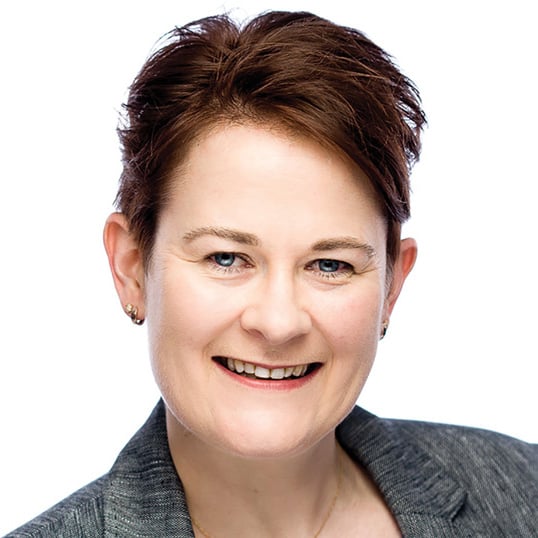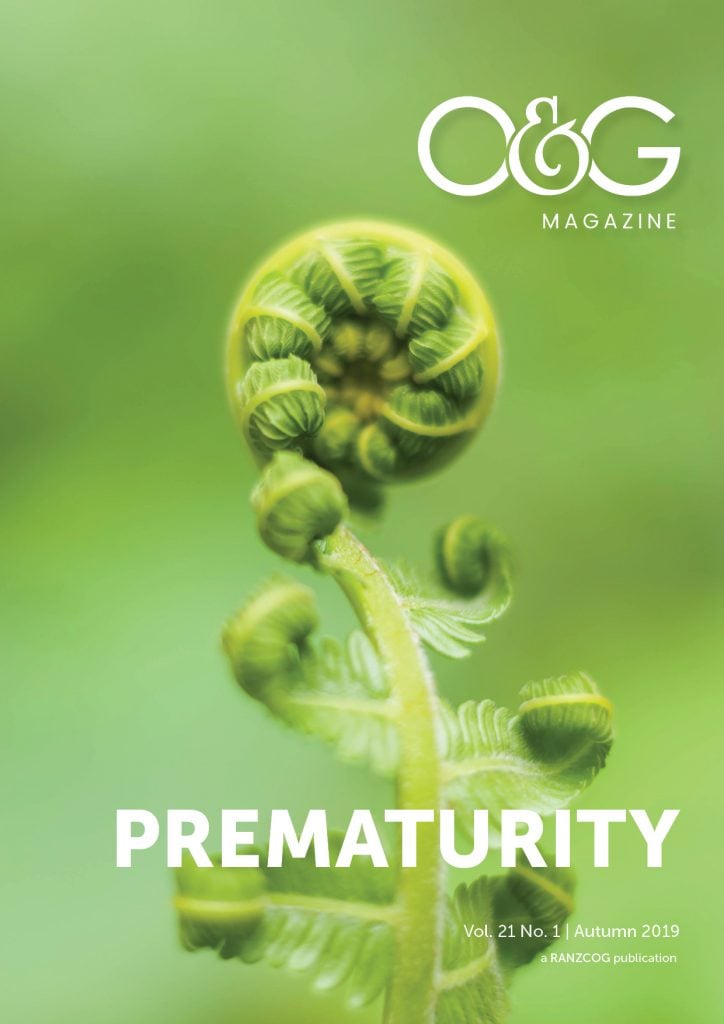This new O&G Magazine feature sees Dr Kirsten Connan in conversation with RANZCOG members in a broad range of leadership positions. We hope you find this an interesting and inspiring read. Join the conversation on Twitter #CelebratingLeadership @RANZCOG @connankf
A/Prof Rosalie Grivell
FRANZCOG, CMFM, PhD
A/Prof Rosalie Grivell is the head of O&G at Flinders Medical Centre, Southern Adelaide Local Health Network, and academic head of O&G for Flinders University, Chair of RANZCOG’s Research Assessment Subcommittee, and an Associate Editor for ANZJOG.
A/Prof Grivell has received a number of professional awards and scholarships, including the RANZCOG Research Foundation scholarship and NHMRC Early Career Fellowship (Australian Clinical Research Fellowship). She has numerous publications, speaks both nationally and internationally, and engages in regular undergraduate and postgraduate teaching and research supervision. A/Prof Grivell has also been a convenor for the Bali International Combined Clinical Meeting, held annually in Denpasar, Indonesia, and key member of the organising group since its inception in 2011.
A/Prof Grivell has recently completed two terms as a SA/NT Councillor, and in February 2019, completed a six-year term as SA/NT TAC Chair, having previously been the trainee rep and the ITP coordinator. In recognition of her significant contribution and commitment to the College, especially her support of the College’s activities and initiatives related to training, A/Prof Grivell will be the very worthy recipient of the RANZCOG Distinguished Service Medal in March 2019!

A/Prof Rosalie Grivell
Why did you choose O&G and your career pathway?
At medical school I did not consider O&G until my fifth-year clinical attachment at Flinders. I was lucky to have a great time in the department, particularly supported by a great mentor (Prof Judy Searle) who was a clinical academic. I really valued her teaching in the clinical arena and also her academic support. From that time onwards, I knew I was going to be a clinical academic. I have her to blame and thank!
What role has the College played in your career?
Aside from training towards FRANZCOG and CMFM, since my time as a senior registrar, I have held formal positions in the College. These roles have always challenged and pushed me to learn and develop both personally and professionally. The networking opportunities that have arisen from these positions have been crucial and added to my own professional development.
I particularly valued and learnt a lot from the relationships I have had with College staff members. So many people have worked for the College and imparted great knowledge, while both truly understanding and advocating for our trainees.
What role do you feel RANZCOG should play with regards to leadership?
I strongly believe that in the last two years of training, the College should increasingly focus on skills such a leadership development. These non-procedural skills are very underdone in our current training program and I feel this leaves our trainees under-equipped for their professional roles.
What do you see as the current challenges for RANZCOG?
The biggest challenge we have at the moment is the gender imbalance in our leadership. Changing this might be challenging, but is absolutely necessary.
What do you see as the current challenges for RANZCOG trainees?
Balancing part-time training with good quality training is still a real challenge. It is still a challenge to support trainees returning to work after extended leave, and I feel we could do this better. We also need to better mentor our trainees to see the ‘big picture’ of specialist practice, as well as improve our support with their transition into this role.
Would you describe yourself as a leader?
Until being in a formal leadership position, I would never have considered myself as a leader; more an advocate and supporter.
Now that I do hold a formal leadership position, I acknowledge that I continue to learn how best to lead on a daily basis.
How did your leadership journey occur?
I have had a very informal journey; I had no formal leadership training. Not ideal and something I feel RANZCOG could actively focus on, now and in the future. A formalised leadership journey with formal leadership training/mentorship would have served me better (and, I suspect, most trainees and specialists).
During my leadership journey, I have had a few fabulous leadership mentors and for that I am truly grateful! Disappointingly, this has been sometimes contrasted with negative influences.
How do you sustain your leadership drive?
Two aspects sustain my everyday leadership journey. Firstly, the belief that I am doing small things that will make a difference to the patients we serve, and, secondly, the encouragement and support of the multi-disciplinary leadership team I work with in the hospital setting.
What do you feel are essential characteristics of a leader?
Whatever your leadership style, I think it is important to see the ‘big picture’ and help others to see it too. I also think it’s important to be able to develop individual relationships so all team members can be supported.
In O&G service provision, given the multi-disciplinary nature of our work, one of the most essential characteristics is recognising the value of your team and being a team player yourself.
What have been the highlights of your professional career?
Without a doubt, the professional relationships I have developed. Some have been medical colleagues, but most have been non-medical (although often healthcare) colleagues.
My biggest supporters (with a few exceptions) have been women of non-medical backgrounds (senior midwives and academics mostly) and I would not be where I am without them.
What have been the biggest challenges during your career?
I think my biggest challenge has been managing myself. Coping strategies have been different at various career stages, but it is always important to have a strong support network, both inside and outside of work.
During my leadership learning, developing and maintaining relationships with all of my professional supporters and colleagues has been what’s kept me vaguely sane!
Have you seen workplace culture change during your career?
The aspect that I think has changed positively in many places is that of supporting trainees on a daily basis. Gone are the days (I hope) of trainees phoning for help in the middle of the night and not being sure if someone would come and help them. This certainly happened to me, but I really hope it doesn’t happen anymore.
A vastly female workforce at all levels (both trainee and now specialist) creates a very different workplace than a balanced one, and I think presents us with a challenge in how to make our workforce more balanced.
How do you balance your personal and professional life?
At the moment, not very well, but I am working on it!
What advice would you give to a trainee at the beginning of their career?
I would encourage all trainees to interact with the College as an institution and to make the most of the opportunities provided while in training. Possibilities are endless and often more than is apparent.
What three words best describe your life?
Grace, justice, determination.
Are you willing to be contacted by trainees for career advice/mentoring?
Yes, particularly in the area of clinical academia.






Leave a Reply